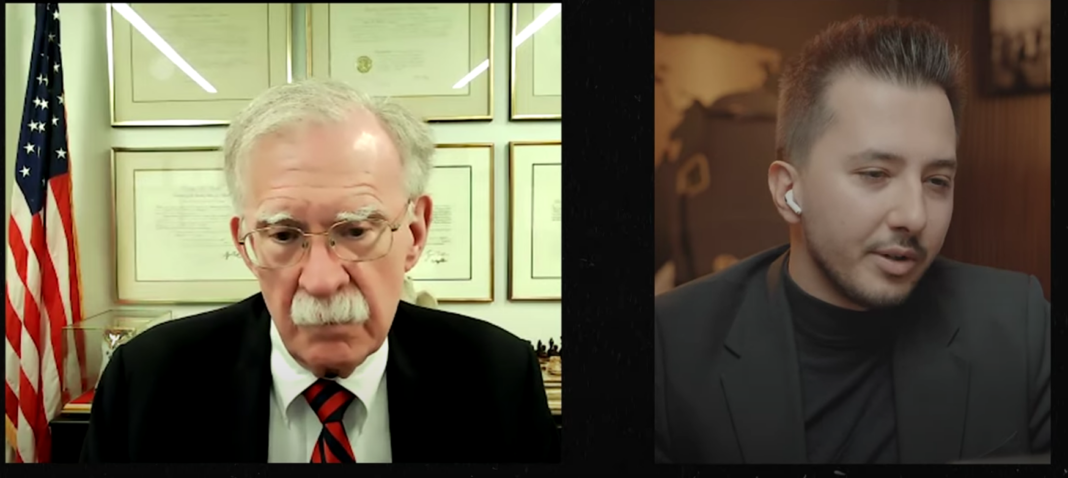Former US National Security Advisor John Bolton has dismissed Turkish President Recep Tayyip Erdoğan’s claims that Fethullah Gülen masterminded the 2016 coup attempt in Turkey, calling them propaganda aimed at consolidating power.
Bolton also denied any US involvement in the coup, which Erdoğan and advisors have previously implied.
Trump'ın Güvenlik Danışmanlığı yapmış olan Bolton'a, Türkiye'deki darbe girişiminde ABD'nin rolü olup, olmadığını sordum:
• Gülen, Erdoğan'a muhalefeti bastırmak için bir bahane verdi. Gülen'in darbeyi uzaktan planlama fikrinin Erdoğan'ın bir propagandası olduğunu düşünüyorum.… https://t.co/SlwBqszDKo pic.twitter.com/wBTpA1Q3JA
— ibrahim Haskoloğlu (@haskologlu) December 17, 2024
Speaking in an interview with Turkish journalist İbrahim Haskoloğlu published on Tuesday, Bolton described Erdoğan’s narrative surrounding Gülen, a Turkish cleric who lived in the US for many years until his death in October and inspired a global civic initiative labeled by Turkey as a “terrorist organization,” as a strategic move to justify crackdowns on opposition groups. He criticized the evidence Turkey provided to the US for Gülen’s extradition, noting it was insufficient for legal action.
Erdoğan has been pursuing followers of the Gülen movement since corruption investigations revealed in 2013 implicated then-Prime Minister Erdoğan and some members of his family and his inner circle.
Dismissing the investigations as a Gülenist coup and conspiracy against his government, Erdoğan designated the movement a terrorist organization and began to target its members. He intensified the crackdown on the movement following an abortive putsch in 2016 that he accused Gülen of masterminding. The movement has strongly denied involvement in the coup attempt or any terrorist activity.
Bolton pointed to Erdoğan’s broader efforts to suppress dissent, asserting that the coup claims served as a pretext for strengthening his control over Turkey.
The former advisor also discussed Turkey’s role in NATO and Erdoğan’s leadership, expressing hope for improved relations post-Erdoğan.
ABD'nin Güvenlik danışmanlığını yapmış olan Bolton:
•Müttefik olmak istiyorsanız müttefik gibi davranmalısınız.
•Türkiye, S-400 aldığında sizle şöyle dalga geçiliyordu,
"Erdoğan, S-400'leri aslında Türk Hava Kuvvetlerine karşı Cumhurbaşkanlığı sarayını savunmak için istedi" https://t.co/itZ8wgRjre pic.twitter.com/tlmtAb8XuU
— ibrahim Haskoloğlu (@haskologlu) December 17, 2024
On broader US-Turkey relations, Bolton pointed to tensions stemming from Turkey’s acquisition of Russian S-400 missile systems, which resulted in its expulsion from the F-35 program. He noted that these actions undermined trust within NATO and positioned Turkey as a problematic ally under Erdoğan’s government.
Discussing regional dynamics, Bolton acknowledged Ankara’s sensitivities surrounding Kurdish groups in Syria and Iraq. While recognizing overlaps between the People’s Protection Units (YPG), a Syrian Kurdish militia, and the Kurdistan Workers’ Party (PKK), designated as a terrorist organization by the United States and Turkey, he denied any US intention to strengthen the PKK. He emphasized the crucial role played by Kurdish forces, including the YPG, in the coalition efforts to defeat the Islamic State in Iraq and the Levant (ISIL).
Bolton also addressed allegations that President Erdoğan manipulated former US President Donald Trump through flattery and personal appeals. He confirmed instances where Erdoğan sought Trump’s intervention, such as the case against Turkey’s state lender Halkbank, which involved accusations of its role in evading US sanctions on Iran, but noted that outcomes rarely aligned with Erdoğan’s expectations.
Regarding Turkey’s future, Bolton urged a pivot away from Russian alliances and a stronger alignment with NATO. He expressed optimism that Turkish citizens would eventually reject authoritarian governance through democratic means.
